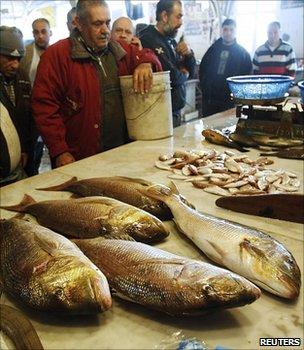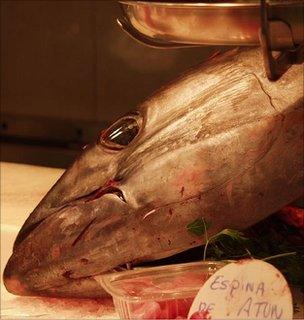Global fish consumption hits record high
- Published

Fish products provide the planet's population with almost 16% of its animal protein intake
The global consumption of fish has hit a record high, reaching an average of 17kg per person, a UN report has shown.
Fisheries and aquaculture supplied the world with about 145m tonnes in 2009, providing about 16% of the population's animal protein intake.
The findings published by the Food and Agriculture Organization, external (FAO) also stressed that the status of global fish stocks had not improved.
It said that about 32% were overexploited, depleted or recovering.
"That there has been no improvement in the status of stocks is a matter of great concern," said Richard Grainger, one of the report's authors and FAO senior fish expert.
"The percentage of overexploitation needs to go down, although at least we seem to reaching a plateau," he observed.
The authors added that it was estimated that the level of overexploitation had increased slightly since 2006, but 15% of the stocks monitored by the FAO were either "underexploited" or "moderately exploited".
This meant that catches in these regions could increase in order to meet the demand for fish products.
Big business
The report also showed that fish continued to be the most-traded food commodity, worth US $102bn (£63bn) in 2008 - a nine percent increase on the previous 12 months.

The authors forecast the status of tuna stocks will deteriorate further unless management improves
China remained the largest fish-producing nation, producing 47.5m tonnes in 2008 (32.7m tonnes from aquaculture and 14.8m tonnes from capture fisheries).
Globally, the data showed capture fisheries produced about 90m tonnes, with 80m tonnes from marine waters and a record 10m tonnes from inland waters.
The authors said aquaculture remained the fastest growing animal food-producing sector, although growth rates were slowing.
Per capita supplies from the sector had increased from 0.7kg in 1970 to 7.8kg in 2008 - an average year-on-year growth rate of 6.6%.
Aquaculture was dominated by production from the Asia/Pacific region, accounting for 89% of global production and 79% in terms of value.
Closing the net
While aquaculture was set to become the main source for fish products in the near future, the authors were concerned about the growing percentage of marine fish stocks that were categorised as overexploited.
They said that most stocks of the top 10 commercial species, which accounted for almost a third of global catches, were fully exploited.
"Of the 23 tuna stocks, most are more or less fully exploited (possibly up to 60%), some are overexploited or depleted (possibly up to 35%) and only a few appear to be underexploited (mainly skipjack)," they wrote.
"In the long-term, because of the substantial demand for tuna and the significant overcapacity of tuna fishing fleets, the status of tuna stocks may deteriorate further if there is no improvement in their management."
They said another threat to the long-term sustainability of fish stock was illegal, unreported or unregulated (IUU) fishing.
According to Illegal-Fishing.info, managed by think-tank Chatham House, IUU was worth up to $23.5bn a year.
In an effort to tackle the problem, the FAO established the Port State Measures Agreement (PSMA) that would require the "port state" to close its ports and ban the landing of fish of any vessel listed as being involved in IUU activities.
Last year, researchers writing in the journal Science warned that global measures to regulate the fishing industry lacked the capability to tackle illegal catches.
During a six-year study, they said that only one third of the vessels listed on IUU registers could be tracked.
The FAO report authors also highlighted another problem facing the world's fisheries: "high levels of unwanted and often unreported bycatch and discards... including the capture of ecologically important species".
"The latest estimate of global discards from fishing is about seven million tonnes per year," they said.
As a result, the UN agency will lead the "development of international guidelines on bycatch management and reduction of discards".
The publication of the report, The State of World Fisheries and Aquaculture 2010, coincided with the opening of the 29th session of the UN Committee on Fisheries being held at the FAO's headquarters in Rome.
- Published30 December 2010
- Published22 October 2010
- Published21 May 2010
- Published8 June 2010